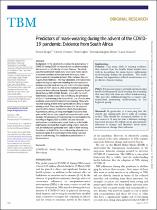| dc.contributor.author | Burger, Ronelle | |
| dc.contributor.author | English, Rene | |
| dc.contributor.author | Maughan-Brown, Brendan | |
| dc.contributor.author | Christian, Carmen | |
| dc.date.accessioned | 2022-06-08T08:54:29Z | |
| dc.date.available | 2022-06-08T08:54:29Z | |
| dc.date.issued | 2022 | |
| dc.identifier.citation | Burger, R., Christian, C., English, R., Maughan-Brown, B., & Rossouw, L. (2022). Predictors of mask-wearing during the advent of the COVID-19 pandemic: Evidence from south africa. Translational Behavioral Medicine, 12(1), 167-179. doi:10.1093/tbm/ibab132 | en_US |
| dc.identifier.uri | http://hdl.handle.net/10566/7501 | |
| dc.description.abstract | Background: In the absence of a vaccine, the global spread of
COVID-19 during 2020 has necessitated non-pharmaceutical
interventions to curb the rise of cases. Purpose: The article
uses the health belief model and a novel rapid mobile survey
to examine correlates of reported mask-wearing as a nonpharmaceutical
intervention in South Africa between May and
August 2020. Methods: Two-way tabulations and multivariable
analysis via logistic regression modeling describe correlations
between reported mask-wearing and factors of interest among
a sample of 7074 adults in a two-period national longitudinal
survey, the National Income Dynamics Study-Coronavirus Rapid
Mobile Survey (NIDS-CRAM). Results: In line with the health
belief model, results showed that self-efficacy, the prevalence
of others’ mask-wearing in the same district, and affluence were
positively associated with reported mask-wearing. Those who
reported staying at home were significantly less likely to report
wearing a mask. There was little evidence that the expected
severity of the disease if contracted, affects these decisions.
Hypertension, obesity, or being overweight (measured three
years earlier) did not have a significant association with maskwearing.
The prevalence of mask-wearing increased significantly
from May to August 2020 as COVID-19 cases increased
and lockdown restrictions were eased. Contrary to the health
belief model, we found that despite having a higher mortality
risk, the elderly had significantly lower odds of mask-wearing.
Conclusion: In South Africa, the mask-wearing adherence has
increased rapidly. It is concerning that the elderly had lower
odds of mask-wearing. This should be examined further in
future research. | en_US |
| dc.language.iso | en | en_US |
| dc.publisher | Oxford University Press | en_US |
| dc.subject | COVID-19 | en_US |
| dc.subject | South Africa | en_US |
| dc.subject | Face-coverings | en_US |
| dc.subject | Masks | en_US |
| dc.subject | Prevention | en_US |
| dc.title | Predictors of mask-wearing during the advent of the COVID-19 pandemic: Evidence from South Africa | en_US |
| dc.type | Article | en_US |

